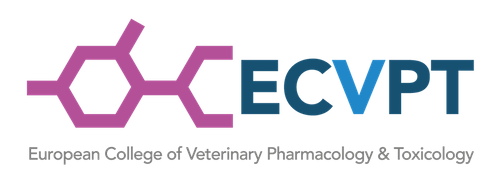The American College of Veterinary Clinical Pharmacology is a specialty board recognized by the American Veterinary Medical Association. The primary objectives of the College are to advance the discipline of veterinary clinical pharmacology as a clinical specialty and assure the competence of those who practice in this field by:
- Establishing requirements for veterinary postdoctoral education and experience for certification in the specialty of veterinary clinical pharmacology.
- Examining and certifying veterinarians as having met the requirements to be a specialist in veterinary clinical pharmacology.
- Encouraging veterinary clinical pharmacologists to pursue a program of continuing education for professional advancement throughout their careers.
- Supporting and promoting education and research and other contributions to knowledge relating to veterinary clinical pharmacology.
- Enhancing the exchange of new knowledge in veterinary clinical pharmacology.
- Organizing committees of experts to research and make recommendations to the profession on current problems in veterinary therapeutics.
The European Association for Veterinary Pharmacology and Toxicology is an association that promotes the disciplines of veterinary pharmacology, toxicology and therapeutics. EAVPT aims to promote education and research in the fields of veterinary pharmacology and toxicology. It achieves these aims through organizing congresses, workshops, symposia or other scientific and educational meetings. In addition, EAVPT enhances the exchange of education materials, ideas and teachers between veterinary institutes. In addition, EAVPT organizes committees of experts to make recommendations on current problems in veterinary pharmacology, toxicology and therapeutics, including concerns in relation to human and environmental health. EAVPT has members from around the world and hosts an international congress every 3 years – with the next congress planned for 2021.
The European Board of Veterinary Specialisation (EBVS®) is the umbrella organization for veterinary specialties within Europe and is composed of one voting representative from each of the EBVS-recognized veterinary specialist Colleges.
EBVS includes 27 veterinary specialist Colleges, comprising more than 36 distinct specialties with more than 3860 veterinarians active as a European Veterinary Specialist™.
European veterinary specialists are ready to serve the public, its animals, and the veterinary profession by providing high quality service in disciplines as varied as anaesthesia and analgesia, clinical pathology, companion animal or equine internal medicine, surgery, ophthalmology, pathology, pharmacology and toxicology, public health, and zoological medicine.
EBVS® awards European Veterinary Specialist™ status based on a specialist diploma being awarded by one of the 27 recognized veterinary specialist colleges following the completion of rigorous postgraduate training, education, and examinations. In addition, European Veterinary Specialists™ are required to demonstrate every 5-years that they still satisfy the criteria for specialist status.
The American Academy of Veterinary Pharmacology and Therapeutics was founded in 1977 and consists of a diverse membership of almost 300 from over 20 countries. The membership shares a common interest in research and teaching in veterinary pharmacology.
Membership in the AAVPT - be it as a Student Member, Associate Fellow, or Fellow - is open to individuals with background and training in veterinary pharmacology.
The Australian and New Zealand College of Veterinary Scientists (ANZCVS) seeks to serve the veterinary profession and reward excellence.
College Membership signifies that a veterinarian has a high level of competence and experience in a specific field. To become a member of the College a candidate must have at least three and a half years post-graduate experience as a veterinarian and have successfully completed both written and oral/practical examinations in one of the diverse range of subjects on offer.
The College is organised in Chapters with veterinary graduates with a special interest in a particular field of veterinary medicine.
The objectives of the Veterinary Pharmacology Chapter are:
- The advancement of the study and understanding of veterinary pharmacology so that the discipline can be applied more effectively for the welfare of animals and man. "Veterinary Pharmacology" embraces chemotherapy, product research and development, pharmacokinetics and pharmacodynamics, drug legislation, clinical pharmacology, toxicology and applied immunology.
- The provision of advice on veterinary pharmacology to the College, other organisations and individual veterinarians and to act as a conduit for the exchange of knowledge between works in the field.
- The support of continuing education and post-graduate training in veterinary pharmacology.
- The encouragement and assistance of prospective members in their preparation for examination by the College.
The Chapter's activities include organising Scientific Meetings, encouraging publication of veterinary pharmacology articles, and conducting the Veterinary Pharmacology Study course for examination preparation by membership candidates.
VetCAST is a EUCAST subcommittee dealing with all aspects of antimicrobial susceptibility testing of bacterial pathogens of animal origin and animal bacteria with zoonotic potential. The subcommittee will operate within the format and structure of EUCAST (The European Committee on Antimicrobial Susceptibility Testing). Click on the "AST of veterinary pathogens" tab in the menu on the left for specific information on VetCAST.

